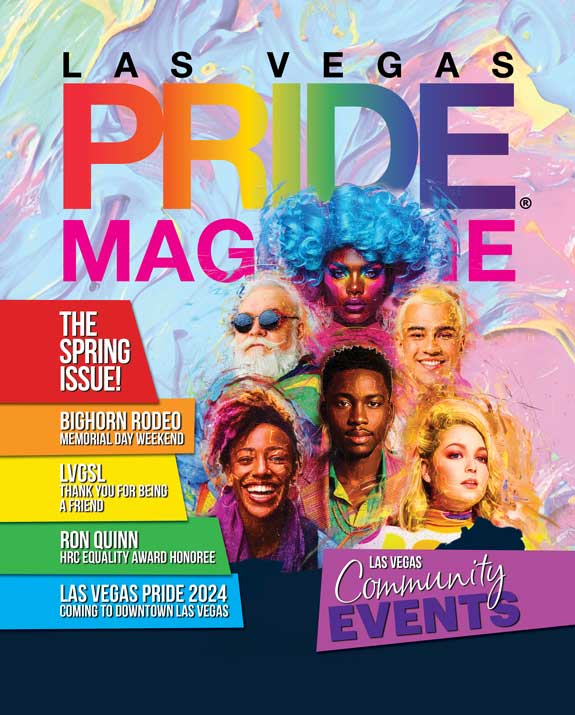Exclusively Inclusive
By Karen Brain
I mentioned we would have our Vegas wedding a year ago, and now I want to share how disability impacted the wedding planning. I didn’t realize how hard it would be. Or how sweet the reward would be. Our special day was filled with beauty, love, happiness, and inclusion, with so many loved ones, just as we dreamed!

Rather than list a bunch of negative vendor evaluations, I’d prefer to list positive encounters and transform any negatives into an educational opportunity to make positive changes moving forward, even if exposing my vulnerabilities and insecurities to do it. As always, please understand that I’m sharing my own experiences, thoughts, and feelings as a person living with a disability; I’m not suggesting mine represent the entire community.
Added Layer of Fun
First, I should explain rheumatoid arthritis (my disability) does not care what you want or have planned in life. It does whatever it wants, whenever it wants. The best you can do is fight it with everything you’ve got. Sometimes you’ll win, sometimes you’ll lose. What it means to fight, win, and lose is different for each person. It’s an autoimmune disease, and stress can make it worse.
During the wedding planning, my arthritis decided to cause another lumbar spinal stenosis, creating constant pain down my legs so severe that to move, I had to hold my breath. That’s right; the pain was so excruciating I could not manage to move AND breathe; nothing relieved it, and the only way I could move about was to hold my breath. It was like swimming with extreme pain. I’d take a breath and hold it, move, then stop to breathe again, take another breath and hold it, and move as far as I could as quickly as I could (like a sea snail’s pace, actually), then stop to breathe again. You get the picture. Every day, I wondered how I would walk down the aisle.
This case was not considered an emergency. It was a routine get-it-authorized and scheduled procedure. However, I did communicate my urgency due to severe pain, decreased functioning, and my goal to walk down the aisle at our upcoming wedding. I don’t know who else was in line before me or how critical all those cases were compared to mine. My fingers were crossed that surgery would be successfully done in time so I could walk down the aisle, fully aware, as always, that arthritis does not care what I have planned in my life, but just praying this time maybe things could please be different.
I am beyond fortunate to work with who I think is the best neurosurgeon and team. Surgery was done three months before our wedding, and I was able to walk down the aisle after all. We thought this was a pretty special wedding gift.
Back to Planning
Neither my spouse nor I have ever been married before. Throughout my life, I did not think I ever wanted to get married, so I didn’t plan for it or pay any attention to weddings. Furthermore, I think I can count on one hand how many formal/traditional weddings I’ve attended. Of those, plus the ones I’ve seen in movies and on TV, I don’t remember any of the couples having a known physical disability. I’m sure it exists. I just haven’t come across it yet. I would remember it because even though a wedding may not be of personal interest to me, accessibility and inclusion for my community have always been of great interest to me.
Hard Times
The deeper we got into planning, the more I realized accessibility accommodations were often not a given or an option within the small Vegas wedding world in which we found ourselves. Not only did I feel like a fish out of water trying to understand the basics, but the added layer of disability issues and feeling like everywhere I turned, there was an undercurrent saying, “This dream day is not for your kind,” was constantly in my face. It was overwhelming and gut-punching. It was also embarrassing to me, so I kept most of these traumatic experiences to myself and suffered alone in silence. Who could I talk to in my world who would understand? Unlike many other communities, I don’t have anyone else in my family or daily life who has the same disability or lived experiences. At that time, I felt nobody could truly understand what I was experiencing and feeling. Sure, I could have talked to my loved ones (including my spouse, family, and wedding party), and I know they would have supported me and probably helped address the issues. That’s what I should’ve done. But I didn’t. It’s like those constant negative messages triggered lifelong traumas I didn’t know were in there (bullying, laughing, belittling, disregarding, intimidating, minimizing, denying, blaming, tone policing). I resorted to my familiar coping mechanisms: hide it, deal with it alone, try to forget it, and move on. Strangely, I didn’t notice it at the time.
Another coping mechanism when living with a disability is to push through pain and challenging times. In other words, if I stayed in bed every time I felt pain or faced a negative message, I’d live my life in bed, and that wouldn’t work for me. It’s a choice I’ve made. I know I’m privileged to have that choice, and like any choice, it has pros and cons. Ironically, what should have been one of the happiest times in my life, so I’m told, felt like one of the loneliest and saddest times. Not because of the continuous messaging of “this is not for you,” that’s just like any other day. But because, in this case, it was supposed to be our dream, one we were paying for, and still the message was clear: this was not for me because of who I am. I couldn’t sleep at night from stress. Feelings of guilt and shame surfaced, just like they did when I was a child, and I’d lay awake watching my spouse sleep, feeling sorry I wasn’t able-bodied to give us an easier, more enjoyable dream experience. And that, my friends, is “internalized ableism.”
Other People
I have always been fascinated by human behavior, and clearly, wedding planning was another scenario that did not disappoint. Every day, the constant messages of “this is not for you” were followed by at least one, “How’s the wedding planning going?” And it seemed like all I could say without breaking down was, “Never again,” even though I knew nobody really understood what I meant. I could not escape it. I faced questions like, “The day is getting closer! Are you excited?” “Have you bought your dress yet?” “What kind of bouquet will you have?” “Who’s walking you down the aisle?” “Will you do the Money Dance?” There were a lot of assumptions there, right?
Plus, the frequency was unbelievable at which I would hear contradictions like, “It’s your special day, you should do whatever you want, but…” followed by strongly encouraging me to do something else that aligned with their opinions and beliefs, all within the same breath. Similarly, “It’s your special day, I’ll do whatever you want, but…” followed by telling me their actual plans, which happened to be opposite of what we wanted. As if including the first half before “but” excused the second half after it. Even more shocking to me was when a few loved ones did this. The irony of some of our closest loved ones disregarding our wants and needs and suggesting their own for our wedding was unexpected and jarring. The worst one suggested I owed it (to whom?) to have the traditional women’s wedding dress try-on party at whatever store that nightmare was supposed to happen “to make them happy” and “give them that dream.” There seemed to be a communication problem I desperately wanted to resolve. Then a friend said, “This reminds me of random strangers who touch pregnant women’s bellies. They do it because they don’t see anything wrong with it. Some people are just rude and weird.” I guess it’s all perspective. (It is important to note that all of our wedding party, everyone who attended the Vegas wedding, and the majority of our loved ones were very supportive of us and our wants and needs for this wedding throughout the entire planning phase and wedding event, for which we were extremely grateful.)
I think we as a society have this idea of what’s supportive, polite, or appropriate to ask the couple, which, in theory, should be an exciting, fun, positive time in their lives. I would argue that these ideas are as outdated as saying a wedding and marriage are only meant for a man and a woman. I would challenge ourselves to rephrase our questions and statements to be more inclusive. Maybe something as simple as “How are you doing?” or let them bring it up. If something is exciting in their lives, it’ll come up in conversation. If they want to focus the conversation on the wedding planning, they can, but a general question may allow them to avoid the topic if they’d prefer. I’m no expert; I don’t have all the answers. I just learned this lesson the hard way for myself.

The Dress
It may have paid for the wedding if I had a nickel for every time someone assumed I would wear a white dress. Really? It must be a dress? It must be white? With all the artistic clothing styles and beautiful colors available today, is a white dress still the top choice? Why, because you look at me and think you see female, so clearly, a white dress is my only choice? It may take a long time to break this “standard” (which may never change if the industry has anything to say about it). However, breaking away from the white dresses (unless that’s your dream), being creative, and thinking outside the box to follow your dream may not only help make costs more reasonable for wedding couples in the future, but could also help increase equity, diversity, and inclusion within the community.
Because of my disability, very rarely can I buy everyday clothes off a rack. So I knew my wedding outfit would not likely be off a rack either. In case I had any questions, multiple painful experiences in stores told me very clearly that “normal” wedding dresses were not for me. Plus, why would I buy an expensive dress that was not of my dreams, which would require alterations that were likely just as pricey to try to make it fit my body? Let’s start with what I know works for my body, the styles and colors I like, and find the right person to make it. Luckily, a friend introduced me to Mary Jill Anderson of Easy Does It Studio in San Diego, California. Friends, this is THE Dressmaker. (She can make anything!) She had pictures of her work all over her studio and works in progress around the room. It was beautiful. She started by sharing with me stories of her previous experiences, which included clothes for current pop stars, famous actors, and performing arts theater productions. (Yes, she listed specific names and examples.) WHAAAT?! Yes, please. Working with Mary Jill was a pleasure and honor; her work is beautiful and impeccable. Mary Jill made me look and feel like royalty on our special day. I cried happy tears on my drive home from her studio every visit, just as I’m crying now remembering this experience. Worth every penny. Thank you, Mary Jill.
More Positives
Before Vegas, I had one appointment to get my hair colored and trimmed, one to get my nails done, and one for waxing services, each with my preferred local providers who have worked with me forever and know my body and needs. In my personal experience, most service providers do not provide quality training on serving customers with disabilities. Yet, we are commonly the customers with a service need as opposed to a privileged service luxury interest. For example, to explain why it is a need and not a luxury, I cannot independently maintain these things myself due to my disability. I can no longer brush or wash my hair independently, and I cannot shave or cut my nails. With an autoimmune disease like rheumatoid arthritis, where the treatment is immunosuppressant medications, personal hygiene, body health maintenance, and preventing infection are imperative. It is not a privileged luxury.
I’ve been working with Ginger at Gingerly Wax in San Diego since it first opened in 2010, and I recently started working with Itza, too. When they learn I receive waxing service, the first thing people ask me is, doesn’t it hurt? To which I respond, compared to what? No, I do not think it hurts. The staff, service techniques, and environment at Gingerly Wax make the experience easy and comfortable, and I think it’s worth it. Everyone who works there provides phenomenal customer service. I can tell Ginger focuses on customer service training with staff by how they have responded to my needs over the years and the needs of others I’ve observed in the reception area. They always communicate with me, asking how I’m feeling about the service, making sure we’re on the same page and it’s meeting my expectations. I can think of multiple times when Ginger and the team have gone above and beyond to accommodate my unique needs without hesitation. We communicate and work together on a solution that works for both of us; that type of service is invaluable. Thanks, Gingerly Wax!
I receive great nail service from Jess Morris in San Diego. She has years of experience and is another service provider who knows how to give great customer service. She communicates and listens well, and provides a comfortable environment where I feel safe and can be completely honest about my concerns and needs. To me, it’s not just your average nail service. She makes sure the nails are cut in a way that works with the unforgiving bends in my arthritic fingers and toes, ensuring the nails don’t grow in a harmful position between appointments. It’s about communicating and working together to get me into a comfortable position for my appointment so I can hold still long enough to allow her to perform her magic without my little digits getting in the way of each other and messing up her beautiful work. All the while, I don’t feel disabled; I feel privileged to be there receiving a luxury service. Thank you, Jess!
I also love my hairstylist in San Diego, Lillian, another top-notch provider in customer support and service delivery. Since my cervical spine is fused at C4-7 in the front and C3-7 in the back, plus the other previous surgeries and bone and joint issues, it can make for a challenge at the sink. Again, working together on solutions to meet our needs is key, and she does it well. She did an amazing job on my hair, leaving me feeling confident, beautiful, and ready for our special day in Vegas. Thanks, Lillian!
When I feel surrounded by negativity and hard times, I do my best to find the positives and stay focused on them until the others subside. Because living with a disability is HARD, but more importantly, it’s inevitable. It’s not about aging, or accidents, or genetics. It’s about being human. We all will experience being disabled at some point. So whether we want to face it or not, it would benefit us to learn more about disability issues.
In Conclusion
If you can imagine for a moment what it was like during that year to continue to work full-time so that I could save up my time off for surgery and the wedding while living each day in excruciating pain. I was holding my breath, moving, holding my breath, moving, and facing closed door after closed door, rude vendor after rude vendor. I experienced stress, lack of sleep, and relived old traumas, all to make everything perfect for our special day without having a clue how to do it. I faced constant messages of “This is not for you,” followed by “How’s the wedding planning going?” Every. Single. Day. My reason for writing this is to demonstrate what it is like to live with a disability and what I mean when I say, “Sometimes the hardest, most painful part about being disabled is being around other humans.” And yet, it does not escape me that I am human, too. Let’s do our best to work together, listen and communicate better, and support one another.
This article was originally published in the 2024 Spring Issue of Las Vegas PRIDE Magazine, and can be read in its original format here.


